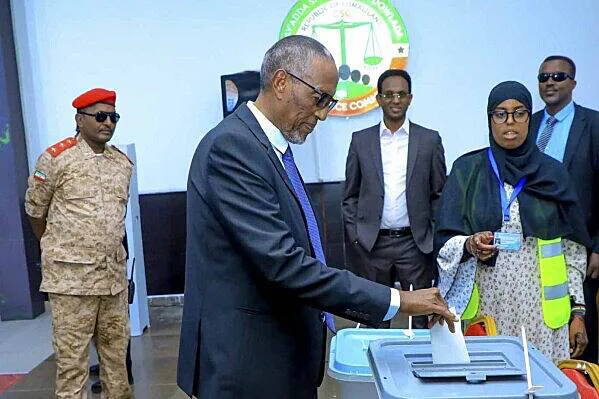Voting underway in Somalia’s breakaway region of Somaliland
3 min read
Somaliland President Muse Bihi Abdi, center, casts his vote inside a polling station during the presidential election in Hargeisa, Somaliland, Wednesday, Nov. 13,2024

Somaliland President Muse Bihi Abdi, center, casts his vote inside a polling station during the presidential election in Hargeisa, Somaliland, Wednesday, Nov. 13,2024
Voting is currently underway in Somaliland’s long-awaited presidential election, a crucial event in the self-declared independent region of the Horn of Africa. Amid growing political tension, over 1 million voters are expected to cast ballots at more than 2,000 polling stations, with 28 international observers overseeing the process.
The election comes after several delays, with some local media reports citing long lines at polling stations as voters express hope for a better future, particularly in terms of economic growth and job creation. As one of the few regions in Africa that has maintained its own governance structures since declaring independence from Somalia in 1991, Somaliland is now seeking to reaffirm its political stability and international standing.
Incumbent President Muse Bihi Abdi, representing the Kulmiye Party, is running for a second term. His campaign focuses on advancing Somaliland’s bid for global recognition as an independent state. Despite its de facto independence, Somaliland is not formally recognized by the international community, including the United Nations, which recognizes Somalia’s territorial claims. Bihi has emphasized the need for further international recognition to improve the region’s diplomatic and economic relations.
His main competitors in the race are Abdirahman Mohamed Abdullahi of the Waddani Party, who has promised democratic reforms and an emphasis on rule of law, and Faisal Ali Warabe of the Justice and Welfare Party. Warabe advocates for a unity government, aiming to bring together the region’s various political factions to address key issues such as development and national cohesion.
Somaliland’s political system and its repeated attempts to engage in democratic processes are notable, especially given the region’s challenges. The election, however, has faced delays, partly due to economic difficulties that have hampered the electoral process. Initially scheduled for 2022, the presidential race was postponed multiple times, heightening concerns about the country’s electoral infrastructure and long-term stability.
One significant factor in the political climate surrounding this election is the region’s complex relationship with Somalia. Somaliland has enjoyed relative peace and stability compared to much of Somalia, which has faced decades of conflict and instability. The self-declared republic, which controls its own borders, military, and currency, has continued to operate independently while Somalia views it as a breakaway region.
A recent agreement between Somaliland and Ethiopia, allowing the latter access to the Indian Ocean via Somaliland’s ports, has further strained relations with Somalia. The Somali government sees this as a potential challenge to its territorial integrity, and tensions have been escalating between the two entities. Somaliland’s growing partnerships with neighboring countries, particularly Ethiopia, have raised concerns in Somalia, where officials view the moves as undermining the possibility of reunification.
This election marks Somaliland’s fourth presidential contest, and despite the region’s relative stability, the electoral process has not been without issues. There are growing concerns about the transparency of the election, especially given the delays and the complexities of organizing a vote in a region with limited international recognition. The participation of international observers is a positive step in ensuring that the election is free and fair, though skepticism about the reliability of the process remains in certain quarters.
As the election unfolds, the region’s future direction is uncertain. While Somaliland has been able to govern itself with a high degree of autonomy, its international isolation remains a significant hurdle. International recognition would help bolster its economy and diplomatic standing, but such recognition has proven elusive due to Somalia’s objections and the broader geopolitical dynamics of the Horn of Africa.
For the people of Somaliland, the hope is that the election will bring stability and improved governance. With economic development and job creation as central themes, voters are looking for leadership that can balance domestic reforms with the complex international dynamics at play. The outcome of this election will likely have significant implications not only for Somaliland’s internal political landscape but also for its future relations with Somalia and the wider international community.
As Somaliland continues to push for recognition, the election represents an important moment in its quest for legitimacy and development. Whether or not the region can overcome its political challenges and gain the recognition it seeks remains to be seen, but for now, the process continues, with millions of voters casting their ballots in hopes of a better future.